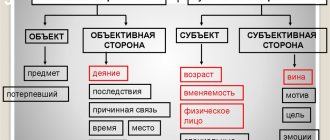Art. 228 of the Criminal Code of the Russian Federation refers to provisions that apply when committing acts against citizens, their health and moral education. It regulates the handling of drugs and determines penalties for non-compliance with established standards. Recently, some changes and amendments were made to it, and criminal liability for the illegal distribution of drugs has become even stricter. In addition to criminal liability, there is also administrative liability.
Art. 228 of the Criminal Code of the Russian Federation can be applied to an offender from the age of 16, and if the drugs were obtained as a result of theft, as well as extortion or robbery, criminal punishment is applied from the age of 14.
Art. 228 of the Criminal Code of the Russian Federation as amended: let’s look at how the terms of punishment have changed.
Important! If you are dealing with your own Article 228 case, you should remember that:
|
Article 228 of the Criminal Code of the Russian Federation - structure
To make it easier to read the text of the article of the law and navigate it, you should structure its content. Thus, the Criminal Code of the Russian Federation contains Article 228, which consists of the following:
- Article 228 Part 1 – significant size. Illegal activities in relation to narcotic substances and dope are listed, and then the measures and degree of responsibility are indicated.
- Article 228 Part 2 of the Criminal Code of the Russian Federation - large size. Punishment is provided for illegal acts specified in Part 1. The size is already assessed as large.
- Article 228 Part 3 of the Criminal Code of the Russian Federation - especially large size. Punishment for crimes specified in Part 1, committed by persons in sufficiently large quantities.
- Notes (3 points).
Stop the mass destruction of Russian youth! People's Initiative for, 228
In his speech at the final meeting of the Board of the Federal Drug Control Service of Russia on February 18, 2022, “On the results of the operational activities of the Federal Drug Control Service of the Russian Federation in 2015 and tasks for 2022,” Ivanov said: “The Federal Drug Control Service of Russia was created 13 years ago purposefully as a special service whose main task is to eliminate transnational organized drug crime. In 2015, the courts issued 4,250 court decisions against the organizers of the drug business, of which 3,611 were based on materials from criminal cases of the Federal Drug Control Service of Russia.” Of the approximately 130 thousand criminal cases initiated on drug charges, only 2.8% are real dealers.
Criminal penalties for illegal drug trafficking
Subjects who have reached the age of 16 and who have committed crimes in the field of:
- illegal acquisition, as well as transportation, manufacture, storage and processing of narcotic substances without the purpose of sale;
- violations of drug trafficking rules;
- illegal sale, manufacture and shipment;
- inducement to use narcotic drugs and their illegal manufacture;
- smuggling and illegal issuance of prescriptions or counterfeits.
Persons over the age of fourteen who are involved in drug theft or extortion are subject to criminal liability.
Criminal punishment for drug trafficking is established by 9 articles of the Criminal Code of the Russian Federation, specified in Chapter. 25 - about crimes against public morals and public health. The legislator provides for different types of liability - from payment of a fine and a prison term to life imprisonment. The final punishment for an act in the sphere of drug trafficking is established by the court.
Current regulatory framework
The punishment depends on the size of the seized substances: a complete list of prohibited substances indicating the quantity can be found in the appendix to the Criminal Code. In this case, the article is responsible only for storage or transportation without the purpose of further sale: the sale is assessed by other laws.
What amendments came out in 2022 under Article 228
Answer: If drugs were planted on your brother, then you must file a statement about this with the prosecutor’s office and the investigative committee. Seek to initiate criminal proceedings against the employees who planted the drugs. Give appropriate evidence to the investigator in charge of the criminal case. Seek a biological examination to determine the presence of biological traces of your brother on the packaging of the drug. Contact me at the phone numbers listed on the website, I will try to help you.
The State Duma has developed amendments to Article 228 of the Criminal Code, providing for a mitigation of punishment for possession of drugs without the purpose of sale, United Russia deputy and head of the working group on improving legislation in the field of combating illicit drug trafficking Nikolai Brykin told the Dozhd TV channel.
The authors of the amendments note that the current situation, “when possession of drugs on a large scale is a serious crime, ensures high performance of law enforcement agencies in solving serious crimes, but does not protect society, replacing the fight against the spread of drugs with the fight against users.”
In connection with the case of Meduza journalist Ivan Golunov, who was charged with attempted sale of narcotic drugs under Articles 30 and 228.1 of the Criminal Code, many spoke out for changes in legislation. In particular, the head of the Accounts Chamber, Alexei Kudrin, said that “serious reform” of Article 228 is necessary. “I welcome the closure of Golunov’s case - it’s good when mistakes are recognized and corrected. But every year about 130,000 people are convicted on drug charges. We need a serious reform of Article 228 of the Criminal Code,” he wrote on Twitter.
In 2022, almost 26 thousand cases of this type, which involve unidentified drug dealers in the absence of information about their type, weight and name, time, place and circumstances of sale, were opened. Only 23 went to trial, and in three of them the accused were acquitted. At the same time, numerous complaints were received - both about the very fact of initiating the case, and from those who were involved in criminal proceedings, and from public organizations, Mr. Zubov said.
You might be interested ==> Selling an apartment in shares in 2022 new
The State Duma will soon adopt a law which, according to deputies, should reduce the number of unjustifiably initiated criminal cases for drug sales. But you shouldn’t count on a softening of that article of the Criminal Code that punishes the consumption and possession of drugs without the purpose of sale.
The purpose of the bill is “to protect citizens from unjustified criminal prosecution,” says Nikolai Brykin (“ER”), who for several years has been heading a working group created under the Duma Committee on State Construction and Legislation to improve the legal regulation of the fight against drug addiction.
And yet, there are much more grounds for bringing charges and articles providing for punishment for participation in drug trafficking. Lawyer Dmitry Antsupov talks about the features of each of them and methods of defending those accused under these articles.
Article 228 of the Criminal Code of the Russian Federation: changes in sentence terms in 2018
The terms of punishment under Art. 228 of the Criminal Code of the Russian Federation is divided into three main points according to the severity of the offense, and only the judge determines which of them will be used in each specific situation.
- If any activity with drugs of synthetic and plant origin is detected, the accused faces a fine of up to 40 thousand rubles. The maximum penalty is imprisonment for up to 3 years.
- In a situation where a drug transaction is considered large, the penalties become more severe. The culprit will be imprisoned for a term of 3 to 10 years and will be fined up to 500 thousand rubles.
- A particularly large transaction with narcotic substances is punishable by a fine of up to half a million rubles and a prison term of up to 10-15 years.
Important!
In addition to the size of the transaction Art. 228 Part 1 of the Criminal Code of the Russian Federation takes into account other nuances when determining the term that affect the severity of the punishment.
Forum – Associations of wives and relatives of prisoners
SPECIFIC EXAMPLES: In the Perm region, 10 kg - 4 years, for 6 kg of seized smoking mixtures in an apartment, which were stored, packaged and sold - 2 people were given 6 years of strict regime, and for 1 gram, which was distributed in their circle – 2 people were given 7 years of strict regime with a fine of 100 rubles. , for 0.3 g - 5 years of regime. In Yekaterinburg, community organizers who made more than one million a day for several years were given 8 and 10 years of strict regime. The conclusion suggests itself: the greater the weight, the shorter the term.
– REVIEW LEGISLATION ON DRUGS Art. 228, 228.1, GOVERNMENT RESOLUTION No. 1002, WITH THE PURPOSE OF HUMANIZATION, ELIMINATION OF THE CORRUPTION COMPONENT AND MOTIVATION FOR DETENTION OF WHOLESALE DRUG DEALERS, AS WELL AS OPTIMIZATION JUDGET FOR RUSSIA, AND NOT TO PLEASE INTERESTED PERSONS.
Amendments and changes under Art. 228.1 of the Criminal Code of the Russian Federation in 2022
Article 228.1 part 1 of the Criminal Code of the Russian Federation
Part 1 1 st. 228.11 of the Criminal Code of the Russian Federation provides for punishment in the form of a prison term (4-8 years) with or without restriction of freedom for up to 11 years.
Article 228.1 part 2 of the Criminal Code of the Russian Federation
According to Part 2 of Art. 228.1 of the Criminal Code of the Russian Federation provides for imprisonment for a term of 5 to 12 years with penalties of up to 500 thousand rubles.
Article 228.1 part 3 of the Criminal Code of the Russian Federation
Crimes provided for in parts 1 and 2 of Art. 228.1 of the Criminal Code of the Russian Federation, committed by a group of persons by prior conspiracy and/or in a significant amount (part 3 of Article 1 228.11 of the Criminal Code of the Russian Federation), is punishable by conviction for a term of 8 to 15 years with a fine of up to 500 thousand rubles.
Article 228.1 part 4 of the Criminal Code of the Russian Federation
According to Part 4 of Art. 228.1 of the Criminal Code of the Russian Federation provides for imprisonment for a term of 10 to 20 years with a fine of up to 1 million rubles.
Article 228.1 of the Criminal Code of the Russian Federation, part 5
Acts provided for in all of the above parts of Art. 228.1 of the Criminal Code of the Russian Federation, committed on an especially large scale (Part 51 of Article 228.11 of the Criminal Code of the Russian Federation) are punishable by imprisonment from 15 to 20 years with fines of up to 1 million rubles. or life imprisonment.
Important!
For Art. 228 and 228.1 are characterized by general principles regarding the statute of limitations. In the first situation, the statute of limitations is 6 years, in the second - 10 years from the date of commission of the act. If the person who committed it hides from the trial, the statute of limitations under Art. 228 is suspended and resumed again from the time of his arrest or surrender.
Extremism, slander and drugs: what will change in the Russian Criminal Code in 2021
In the Russian Federation, amnesty was first used in the 19th century, and then the tradition of declaring it on various memorable dates was adopted. Most often in recent years, partial or complete amnesty for those convicted of criminal offenses is timed to coincide with the anniversary of Victory Day. Today, many lawyers are receiving requests from relatives of prisoners regarding whether an amnesty should be expected this year. According to the latest news, two possibilities for holding an amnesty are being considered in view of the memorable date, namely the seventy-fifth anniversary of Victory in the Second World War.
Matvienko announced the timing of approval of the rejected amendments to the “Golunov” article
Full explanation on the topic: “228 of the Criminal Code of the Russian Federation, changes in March 2022” from a professional lawyer with answers to all your questions. I heard that amendments to Article 228 Part 2 were recently released, but not a single site gives me new amendments. Are there any amendments? Thank you.
It is worth recalling that more than a year ago, the above-mentioned working group, which included deputies, senators, human rights activists, experts, representatives of the FSB, the FSIN, the Ministry of Internal Affairs, the Ministry of Health and the Prosecutor General's Office, based on the results of an analysis of Russian anti-drug legislation and taking into account the proposals of the Commissioner for Human Rights in the Russian Federation Tatyana Moskalkova has prepared a bill to slightly soften Article 228 of the Criminal Code, which punishes possession and production of drugs for personal purposes. In particular, it was proposed to reduce the terms of imprisonment for certain offenses (there is no alternative) and provide for the possibility of deferring the execution of a sentence if the convicted person is being treated for drug addiction. But after President Putin spoke out against easing the Criminal Code even for consumers last summer, instructing the Prosecutor General’s Office to look at law enforcement practice, this bill received a negative response from the government and was not submitted for consideration by the State Duma.
The Duma Committee on State Construction and Legislation has prepared for the second, decisive reading a bill that clarifies in the Criminal Procedure Code the procedure for initiating cases related to the sale of drugs and their precursors. In general, it could be adopted next week, and, apparently, will come into force at the beginning of the New Year.
However, Brykin, who in the past himself served in the Ministry of Internal Affairs, still believes that there is a problem, and it must be solved: “traffickers should be imprisoned for maximum terms and there can be no leniency towards them, but drug users are sick people, they need to be engage, and the sanctions for consumption and possession must be changed." On the other hand, he told MK, “this is a delicate matter, and you can’t just release all drug addicts from prison, all decisions must be made purely individually.”
In conclusion, I would like to advise all prisoners under Article 228 and their relatives not to despair. As practice shows, a very significant number of convicts manage to get a lucky ticket in the form of a court ruling on parole. Go for it - and maybe you will get lucky!
Health status is also an important factor that the court pays attention to when considering a petition. If a convicted person develops or worsens serious illnesses while serving his sentence, this can greatly contribute to a positive decision on early release.
Chances of parole under Art. 228 of the Criminal Code of the Russian Federation
Today, a huge number of people convicted under articles of the Criminal Code related to drug trafficking are serving their sentences in the colonies of the Federal Penitentiary Service of Russia. According to judicial statistics, almost a quarter of the entire prison population of Russia are convicted under “narcotic” articles. In absolute numbers, this is about 130-140 thousand people. At the same time, many prisoners under Art. 228 of the Criminal Code of the Russian Federation imposed very significant terms of imprisonment.
“Nothing fatal will happen if, in my opinion, we reject it with the creation of a conciliation commission and carefully listen to all parties and find the most optimal solution that will protect the rights of our citizens to the greatest extent. In a month, relatively speaking, nothing will change, the conciliation commission will work, and in January we can already adopt this law in an agreed form. It seems to me that there is no need to rush,” the speaker said.
Senator Nikolai Fedorov spoke in support of the law and called for “freeing our discussion from legal husks and, one might say, balancing act” in order to protect “tens of thousands of families who are innocently suffering and persecuted.”
According to Zubov, by proposing this initiative, it was planned to resolve a situation that causes a large number of complaints and appeals, controversial and conflict situations. The deputy minister noted that we are talking about frequent situations when traces of potent narcotic or intoxicating substances are found in the body of a living or dead person, but it is not possible to determine what kind of substance it is, how much it is in the body and how it can be classified.
You may be interested in:: Amount of subsidy for the resettlement of communal apartments in 2022
— Grant the court the right to defer serving the sentence for those convicted under Part 2 of Article 228 of the Criminal Code of the Russian Federation to real imprisonment, who are recognized as drug addicts and have expressed a desire to undergo medical rehabilitation. That is, the bill proposes to provide those convicted under Part 2 of Article 228 of the Criminal Code of the Russian Federation with the opportunity to receive treatment instead of being sent to prison. I will add that the bill does not provide for mitigation of punishment for drug sales, therefore, amendments to Article 228.1 of the Criminal Code of the Russian Federation are not expected in 2022.
Amendments and changes in 2022: Art. 228 Criminal Code of the Russian Federation, part 2-4
Art. 228 of the Criminal Code of the Russian Federation (Part 2) concerns entities who, according to their official position, must strictly comply with the requirements for the storage and transportation of drugs produced from narcotic substances. If the rules are violated, the culprit will face a fine or community service. In this case, the offender is forever deprived of the right to hold certain positions.
If, due to improper storage of narcotic drugs, harm was caused to one or more subjects, or the harm was caused intentionally, punishment is provided in the form of a prison term.
According to part 3 of Art. 228 of the Criminal Code of the Russian Federation, a person who illegally acquired drug precursors or violated the rules for storing and transporting these substances may be punished with correctional labor. If the act was committed on a particularly large scale, the person faces imprisonment or large fines.
Part 4 provides for acts committed on a large scale (prison term with payment of a large fine). Punishment for actions committed by a group of persons or by one entity who used his official position is determined according to the same part.
The State Duma will review the procedure for initiating drug cases
Otherwise, this may lead to a relapse in the form of committing a socially dangerous act, which means a new court decision and being sent to prison. It is imperative that measures for early release be taken in relation to citizens who bear criminal penalties in connection with the commission of a criminal offense.
As a result, at the moment, preparation of narcotic drugs for sale is impossible (Part 1 of Article 30 of the Criminal Code of the Russian Federation). This means that if a person is detained, even at the stage of acquiring narcotic drugs, or storing them for the purpose of distribution, now, when a person is detained and a criminal case is initiated in connection with drug trafficking, the investigative authorities initiate and charge an attempted sale.
Lawyers and attorneys who are registered on the Russian Legal Portal will try to help you from a practical point of view in this matter and will advise you on all issues of interest.
There And they shoot people for corruption, but we: we have petty thieves in prison and ministers and others are not subject to prosecution, maniacs and murderers are given shorter sentences than green boys for drugs. I agree 200%, I also went through this hardship, my condolences.
In addition, it is necessary to take into account the decisions of the UN Commission on Narcotic Drugs to classify new substances as narcotic drugs or psychotropic substances, adopted after the publication of this List (clause
1 Resolution of the Plenum of the Supreme Court of the Russian Federation dated June 15, 2006 N 14 “On judicial practice in cases of crimes involving narcotic drugs, psychotropic, potent and toxic substances”).
We recommend reading: Earth out of turn Chernobyl benefits
2. The same acts committed on a large scale - Information on changes: Federal Law of March 1, 2012 N 18-FZ, Article 228 was supplemented by Part 3, which comes into force on January 1, 2013. 3. The same acts committed on an especially large scale, - Notes. 1.
A person who has committed a crime under this article, who voluntarily surrendered narcotic drugs, psychotropic substances or their analogues, plants containing narcotic drugs or psychotropic substances, or parts thereof containing narcotic drugs or psychotropic substances, and who actively contributed to the detection or suppression of crimes related to illegal turnover of the specified means, substances or their analogues, as well as with the illegal acquisition, storage, transportation of such plants or their parts containing narcotic drugs or psychotropic substances, the exposure of the persons who committed them, the discovery of property obtained by criminal means, is exempt from criminal liability for this crime.
The humanization of especially qualified personnel has not been spared, which previously was from 10 to 15 years, and now, according to the draft law, will be from 5 to 15 years.
In fact, the maximum term has not changed, but now the judge can give 5 years, as, for example, for a large amount, or 15.
Qualification, of course, will depend on the circumstances and discretion of the judge, but in essence we can conclude that this really changes the situation. What is this?
Amendments to parole in 2022. Art. 79 of the Criminal Code of the Russian Federation provides for conditional early release (PAROL) if conditions are met.
Next year, it is expected that several changes will be made to the legislation on the issue of granting amnesty to those convicted of committing crimes earlier than the previously established period.
This is evidenced by statements from the Russian Ministry of Justice. What amendments are planned to be made to the law and how will release be implemented under the new Criminal Code of the Russian Federation?
Drug-related crimes will only be partially amnestied this year. So, will Article 228 be covered by the 2022 amnesty, what documents need to be prepared and what to do if you or your relative have been put on trial under this article or have already been convicted.
The clauses of the document provide for punishment for the purchase and storage itself, as well as the illegal manufacture and further transportation of narcotic, psychotropic compounds and similar drugs or plants. The concept of “illegal acquisition” does not only apply to purchases. The product can be gifted, appropriated, exchanged without the purpose of further sale. The collection of plants for the appropriate purpose is also taken into account.
At the same time, social infrastructure objects are understood as organizations of healthcare systems, education, preschool education, enterprises and organizations related to recreation and leisure, service sectors, passenger transport, sports and recreational institutions, a system of institutions providing legal, financial and credit services, and others objects.
15357
23825
Administrative punishment
Administrative liability is possible for proven regular use of narcotic drugs and/or psychotropic drugs without a doctor’s prescription. However, in this situation, the above article can also be applied. 2281 part 1 of the Criminal Code of the Russian Federation, if we take into account that the offender is purchasing, as well as transporting and storing drugs.
According to Art. 228 of the Criminal Code of the Russian Federation, punishment is possible both for the acquisition of drugs for compensation (for money or services) and for receiving drugs for free. The exception is their purchase only as prescribed by a doctor, which must be confirmed by a prescription, medical history and other medical documentation.
Important!
Illegal possession may imply possession of drugs in a certain amount, therefore, even personal use, and even more so the production of drugs, can be attributed to norm 228 of the Criminal Code of the Russian Federation. What punishment awaits in this case is determined by a court decision, taking into account all the features.
The wiretap is canceled
The acquisition and storage of narcotic drugs, psychotropic substances or their analogues, as well as plants or their parts containing narcotic drugs or psychotropic substances, or their parts containing narcotic drugs, psychotropic substances, for the purpose of sale should be qualified as preparation for sale of these items.
If the person selling narcotic drugs or psychotropic substances knows that they will be used by the buyer to commit other crimes (for example, to induce third parties to use drugs), the seller’s actions are subject to additional qualification as aiding and abetting the commission of relevant crimes.
How to get the minimum punishment under Art. 228 Criminal Code 1 of the Russian Federation
The legislation of the Russian Federation provides for the possibility of receiving a minimum punishment for almost any act provided for by the norms of the Criminal Code of the Russian Federation. Crimes in the field of trafficking in narcotic and psychotropic substances are no exception.
The court determines the minimum punishment not only by the provisions of the Criminal Code of the Russian Federation that directly qualify this type of act, but also by other norms of this legislative act that influence the judge’s decision.
Can be used:
- Art. 61 of the Criminal Code of the Russian Federation - mitigating circumstances of the crime;
- 62 of the Criminal Code - in the presence of mitigating circumstances, a punishment is imposed;
- 64 of the Criminal Code - imposition of a more lenient punishment than established by law for a crime.
Parole (parole) when setting a term
Persons convicted of drug transactions are eligible for parole. Conditional early release under Art. 228 of the Criminal Code is used with an appropriate attitude towards work or education during imprisonment. Willingness to compensate for the damage caused also applies to mitigating circumstances.
The convicted person must serve at least ¾ of the sentence determined by the court; only then can he apply for parole. They will be considered if the convicted person has not committed any offenses over the past three years.
Summary
When determining the punishment for a particular act, it is impossible to predict the outcome of the case in advance, even if guided by the practice of judicial proceedings in a particular region. The term for each crime is determined taking into account the personality of the accused, the various circumstances of the crime, as well as the behavior of the culprit during the investigation, etc.
A drug lawyer will take into account all the details of the case and will achieve the best conditions during the investigation, since he has access to the case documents. However, you need to hire a specialist as early as possible.
Get the most detailed advice on the issue of punishment terms under Art. 228 of the Criminal Code of the Russian Federation, you can contact the website for advice, use the online chat in the lower right corner or call the phone number indicated on the website.










